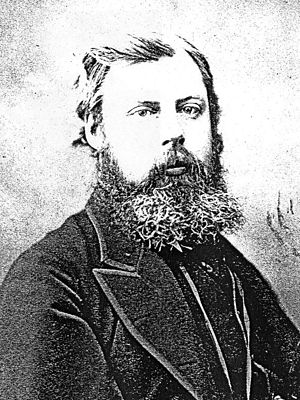William Howship Dickinson
William Howship Dickinson (9 June 1832 – 9 January 1913) was a prominent English physician and medical author, known for his contributions to the study of kidney diseases and neurology. He was a key figure in the development of medical education and practice in the late 19th and early 20th centuries.
Early Life and Education[edit | edit source]
William Howship Dickinson was born in Brighton, Sussex, England. He was the son of Sebastian Dickinson, a solicitor, and his wife, Mary Howship. His maternal grandfather, John Howship, was a noted surgeon, which influenced Dickinson's interest in medicine. He was educated at Rugby School and later attended Trinity College, Cambridge, where he graduated with a Bachelor of Arts in 1854.
Medical Career[edit | edit source]
After completing his undergraduate studies, Dickinson pursued medical training at St George's Hospital, London, where he qualified as a Member of the Royal College of Surgeons (MRCS) in 1857. He became a Licentiate of the Society of Apothecaries (LSA) in 1858 and obtained his MD from the University of Cambridge in 1861.
St George's Hospital[edit | edit source]
Dickinson's career was closely associated with St George's Hospital, where he served in various capacities. He was appointed as an assistant physician in 1861 and later became a full physician in 1874. He was also a lecturer on medicine and played a significant role in the education of medical students.
Contributions to Nephrology[edit | edit source]
Dickinson is best known for his work on renal diseases. He published extensively on the subject, including his influential book "On Renal and Urinary Affections". His research contributed to the understanding of Bright's disease and other kidney disorders. He was one of the first to describe the association between hypertension and kidney disease, a concept that laid the groundwork for future studies in nephrology.
Neurology and Other Interests[edit | edit source]
In addition to his work on kidney diseases, Dickinson made significant contributions to the field of neurology. He published papers on cerebral palsy and other neurological conditions. His interest in the nervous system extended to his studies on the anatomy and pathology of the brain.
Publications and Legacy[edit | edit source]
Dickinson was a prolific writer, contributing numerous articles to medical journals and authoring several books. His works were widely respected and used as references by his contemporaries. He was a member of several professional societies, including the Royal College of Physicians, where he served as a censor.
Personal Life[edit | edit source]
William Howship Dickinson married Laura Elizabeth, daughter of Sir George Burrows, in 1861. They had several children, and Dickinson was known for his dedication to both his family and his profession. He retired from active practice in 1898 but continued to write and contribute to medical literature until his death in 1913.
Related Pages[edit | edit source]
Search WikiMD
Ad.Tired of being Overweight? Try W8MD's physician weight loss program.
Semaglutide (Ozempic / Wegovy and Tirzepatide (Mounjaro / Zepbound) available.
Advertise on WikiMD
|
WikiMD's Wellness Encyclopedia |
| Let Food Be Thy Medicine Medicine Thy Food - Hippocrates |
Translate this page: - East Asian
中文,
日本,
한국어,
South Asian
हिन्दी,
தமிழ்,
తెలుగు,
Urdu,
ಕನ್ನಡ,
Southeast Asian
Indonesian,
Vietnamese,
Thai,
မြန်မာဘာသာ,
বাংলা
European
español,
Deutsch,
français,
Greek,
português do Brasil,
polski,
română,
русский,
Nederlands,
norsk,
svenska,
suomi,
Italian
Middle Eastern & African
عربى,
Turkish,
Persian,
Hebrew,
Afrikaans,
isiZulu,
Kiswahili,
Other
Bulgarian,
Hungarian,
Czech,
Swedish,
മലയാളം,
मराठी,
ਪੰਜਾਬੀ,
ગુજરાતી,
Portuguese,
Ukrainian
Medical Disclaimer: WikiMD is not a substitute for professional medical advice. The information on WikiMD is provided as an information resource only, may be incorrect, outdated or misleading, and is not to be used or relied on for any diagnostic or treatment purposes. Please consult your health care provider before making any healthcare decisions or for guidance about a specific medical condition. WikiMD expressly disclaims responsibility, and shall have no liability, for any damages, loss, injury, or liability whatsoever suffered as a result of your reliance on the information contained in this site. By visiting this site you agree to the foregoing terms and conditions, which may from time to time be changed or supplemented by WikiMD. If you do not agree to the foregoing terms and conditions, you should not enter or use this site. See full disclaimer.
Credits:Most images are courtesy of Wikimedia commons, and templates, categories Wikipedia, licensed under CC BY SA or similar.
Contributors: Prab R. Tumpati, MD

